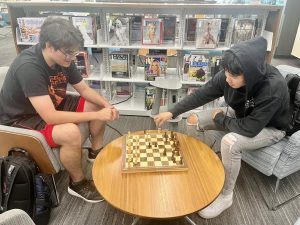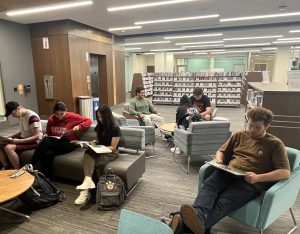
There are so many moves to consider when you start college, whether you are a first time college student right out of high school or you have had some other experiences and are returning to school. Most colleges and universities offer a college success course to help students transition to college and increase the number who stay and complete their educational goals. At Harper College, a team of faculty, advisors, staff, and administrators works to offer a quality First Year Seminar to ensure that all Harper students like yourself have the opportunity to learn information and strategies needed to have a successful start to college and are equipped to utilize resources the campus offers when challenges arise. For over more than a decade, our team at Harper has been developing the curriculum and resources that you will experience in the First Year Seminar in an effort to provide you with an overview of everything you need to get off to a great start.
“College Life-Navigating the System and Campus Resources” will allow you to learn about all of the supports that are available to you such as the One Stop where you can go to get any questions answered, the Academic Support Center where you can get tutoring support, and many other relevant resources such as Counseling and Student Engagement. Research across institutions shows that students are more successful when they are aware of and utilize the resources available to them on campus, but you won’t use these supports if you don’t have a structured opportunity to learn about them, how to access them, and how they can help you.[1]
“College Learning-Strategies for Academic Engagement and Success” will help you learn about strategies for deep engagement and active learning so that you can adapt them for use to meet your needs in each type of course you take. College requires refinement of many learning skills such as time management, selecting and organizing material from lectures and texts, and application of recommended learning and memory strategies. Spending time reading, studying, and working on assignments is crucial, but you also need to have effective strategies to get the most out of your time and efforts. You have likely learned some strategies in previous school experiences, but college typically requires an upskilling of strategies as the amount of material you work with, independent learning required, and even interdependence on faculty, tutor, and peer support increase dramatically. We want to make sure you go in prepared!
“Career Development-Developing an Academic and Career Plan” is important as research suggests that by helping students identify majors and enter into career programs early on, community colleges will see stronger completion rates.[2] Our job to provide you with opportunities and guidance to explore careers and majors so that you can get a better sense of what you would like to accomplish at Harper. Using resources such as a quality career assessment and databases with information compiled from the Bureau of Labor Statistics to explore majors of interest and learn how you can prepare the skills and credentials you need will help increase your motivation to complete even your least favored classes. We also want to make sure you are aware of career development resources through the college such as career counseling and the Job Placement Resource Center. A vision for your career will help you stay focused.
“Critical Thinking and Problem Solving” will help you learn to use critical thinking skills in order to evaluate information in a guided process to make decisions and solve problems. Often, we make decisions based on what we have observed or been told or even our gut feelings, but we want to make sure we know how to access and utilize appropriate information to make informed decisions individually and as members of communities. Making healthy, intentional decisions is an important part of everyday life, and the decisions you make now can set a foundation for a promising future. After all, one of the main goals of higher education is to become critical thinkers.
“Information Literacy and Source Documentation” will allow you to level-up your library research and source documentation skills, which will be useful in many courses and when you need to research something in your personal or professional lives. Using the library databases helps you to use more advanced features in your searches to find more quality sources and take advantage of other benefits such as the electronic citation tools. We also want to make sure you are connected to the library as a main campus resource that offers comfortable spaces to work and practical resources such as research appointments and 24-7 live chat for assistance.
“Diversity and Cross-Cultural Awareness” provides you with deeper understanding of how your backgrounds and experiences may have shaped your perspectives as well the value of increasing your awareness of the origins of others’ perspectives. A primary goal of higher education is to be able to examine social issues and critically engage in discussions to learn from one another. Our goal in these dialogues as participants in higher education is not necessarily to all agree but rather to increase our ability to understand a variety of viewpoints and work together toward equity, which is essential for our civic engagement in a democratic society.[3] Understanding the purpose of college opportunities to grow in your social awareness and critical engagement will prepare you to engage in purposeful dialogue in college courses and in the community.
“Contextualization and Integration” will help you to connect what you are learning in our course to the real-world context, which includes your personal and work lives. You will also become more aware of how to identify workplace skills and personal qualities you have learned from your educational and life experiences and how to integrate them into your ongoing career development as you continue to develop academically and professionally. Our goal is to connect what we are learning in this class to your real-world experiences and future plans so that you have a strong sense of purpose for your college endeavors going forward.
As a group of college educators who care deeply about your success, we hope to provide you with all the information and support you need as you consider each move you make during your first year. We hope that in taking this course, you will feel like part of a community, whether you connect on campus, online, or through a combination of both; this course is meant to make Harper feel like a home where you can get all the support you need to meet your goals.

- Kuh, George D., et al. Student Success in College: Creating Conditions That Matter. Jossey-Bass A Wiley Imprint ,2010. ↵
- Bailey, Thomas R., et al. Redesigning America's Community Colleges : A Clearer Path to Student Success. Harvard University Press, 2015. ↵
- Guarasci, Richard. “Anchoring Democracy: The Civic Imperative for Higher Education.” Liberal Education, vol. 104, no. 1, 2018. ↵

